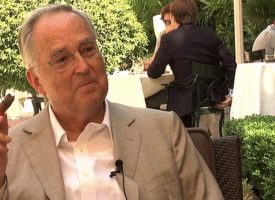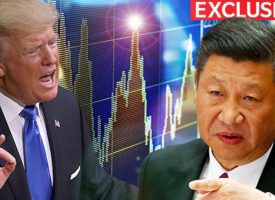The pace to a new global monetary system accelerates as the war in Ukraine is heats up.
October 31 (King World News) – Dr. Stephen Leeb: The pace to a new monetary system appears to be accelerating. As to its form, gold will almost surely be at its center, as the linchpin of a basket of a basket of currencies linked via blockchain. Recently the World Gold Council, the trade group for all things gold, suggested that gold trading be removed from London and New York and replaced with a blockchain tracking every gold transaction among countries and, probably, individuals withing countries. My strong guess is that the two blockchains will be linked.
None of this surprises me, as you’ll know if you’ve read my last book, China’s Rise and the New Age of Gold. I am surprised, though, by how ferociously this transition to a new monetary system – which is essential to an orderly world – is being resisted by the U.S.
I had hoped, perhaps quixotically, that U.S. leaders would realize that resource scarcities are an existential problem for humanity and that the distribution of resources is highly tilted in favor of the South Eastern part of the world. Such a realization might push the U.S. to accept a new monetary system as a chance to start over, to step back from the current course, which I believe is taking this once-great country close to an abyss.
Instead, the U.S. has chosen a course that is inflicting major pain on our economy and even on our once-peerless military. But at best, it will merely delay the transition. And in the worst case it would lead to monetary or military catastrophe, even to the point of eliminating humankind from the planet. It’s almost as if some higher power is looking down and saying, it’s time you do something to prove you deserve to inhabit this wonderful planet.
I find it painful to trace our recent trajectory, having for all my life believed in the image of our founding fathers and the sacred freedoms of religion, speech, press, and more. But as I see it, we’re no longer a free country, as our decision makers have become caught up in preserving what no longer exists, to the point of becoming slaves to a fantasy.
The US Is Losing Both Wars
I can’t tell if the media is knowingly lying about what’s happening or believes the various narratives being spun by the country’s power brokers. What seems plain is that we are currently fighting two wars. One is a monetary war, the other the military war in Ukraine. And we are losing both…
ALERT:
This company is about to start drilling what could be one of the largest gold discoveries in history! CLICK HERE OR ON THE IMAGE BELOW TO LEARN MORE.
Moreover, it is becoming ever clearer that these wars are the last the collective West will fight. After Ukraine, it will be clear that fighting for unipolarity is tantamount to fighting for worldwide destruction.
One data point that stands out is comparing the performance of the U.S. economy with that of Russia. The difference is so glaring – in Russia’s favor – that not even the most pro-Western sources, like the Economist, can cover it up. In a brief article in the October 15 issue, the magazine shows how hard it was to admit the truth but with almost laughable reluctance did manage to do so.
The article begins: “These days Russians do not have much to boast about” and continues in this vein for a few more three paragraphs. Then comes the shocker, in the penultimate paragraph: “Despite these problems, the recession has probably now come to an end.” Citing statistics from Goldman Sachs, which tracks current activity such as shopping, transportation, and other variables that can be verified by satellites and other tools, it concluded that Russia has emerged from a recession, one that actually began in 2021 and appears to have ended in early 2022.
While not giving exact figures, the article includes a chart that suggests that over the past several months the Russian economy has been growing at bit more than 4%. Some would say that’s typical of an economic boom.
Absurdly, though, the magazine’s own assessment is that for the year, Russia’s economy will decline by 3%-4%. (Goldman Sachs is not cited as a source of this absurdity.) I’ve noted previously that evidence including the strong ruble and Russia’s lowering of interest rates suggest Russia’s economy was far stronger than it was being painted in the West. But I was surprised to read just how strong it had become, in striking contrast to U.S. and European economies. It makes it plain how badly our main monetary weapon, sanctions, has boomeranged.
The way in which the military war is covered by the media arouses even stronger feelings of disgust and incredulity. The disgust comes from the emphasis on the rectitude, the morality of defending Ukraine – painting it as a contest between decent Ukrainians and a malign, terrorist Russia led by its Nazi-like leader, the unspeakable Vladimir Putin. (A recent article in the New York Times accused Russians of bombing civilians in Kherson, a city occupied and controlled by Russia. The city, as mentioned below, has been evacuated and is currently occupied only with Russian military).
If you detected sarcasm, you’re not wrong. I certainly don’t view Putin as a saint. But nor do I see him as an autocratic monster bent on destroying Western civilization. When he assumed power in 2000, he wanted join NATO and was not against democratic elections within Russia. It’s worth listening to interviews, available on YouTube, with Jeffery Sachs, the highly respected economist who heads an institute at Columbia University on promoting economic development and chairs a U.N. committee devoted to world development. At the end of the Cold War, Sachs, working the auspices of the UN and with the administrations of the first Bush and Clinton had the job of transforming Russia and Poland into democracies. He succeeded with Poland but failed with Russia.
Sachs makes clear that while the U.S. was ready to help Poland, it refused to lift a finger to aid Russia. Before Russia’s invasion of Ukraine, Sachs pleaded with Washington to accede to Putin’s single request for peace, which was to pledge that Ukraine would never become part of NATO, something that would result in Russia being surrounded by NATO members and the situation devolving into a mirror image of the Cuban missile crisis. Despite Sachs’s stature and knowledge, the request was denied without qualifications or reasons…
Billionaire Eric Sprott is a big investor in this remarkable silver company click here or on the image below

In nearly any situation you can find traces of humor. In October, the Progressive Governance Summit was held in Germany. The summit, which featured a video introduction by German Chancellor Olaf Scholz, convenes annually to extol the merits of a unipolar world in which all countries share the same values and moral rectitude that define the U.S. I don’t really understand how neocons and neoliberals managed to unite under the rubric of “progressivism.” But they did, and today the neoliberal wing is perhaps best represented by the well-known columnist and commentator Anne Applebaum, who writes for Atlantic.
Led by the U.S., Western aide to Ukraine amounts to a number a bit shy of $100 billion and counting. Indeed, the neocon/libs in Congress want to add $50 billion more to the total before the midterm elections. One result of all this aid is that West has run out of weapons, literally. Inventories of weapons are so low that all the game-changing weapons are being replaced by weaponry whose provenance in some cases is WWII. If you find this hard to believe, the source is comments from U.S. Defense Secretary Lloyd Austin as well as various Pentagon briefings.
In a discussion group, the issue of why the West was no longer delivering modern tanks to Ukraine came up, to which Anne Applebaum added a brand-new rationale for why Ukraine is so badly losing. Her comments are available on the YouTube channel, Progressive Zentrum. Responding to a question from the audience as to why Germany has stopped delivering advanced tanks to Ukraine, she said: “I’ve been in Germany for a couple of days, and it’s true that the issue of tanks continues to arise. And I have been asking myself why they are not being delivered … there is something deeper …this is not unique to Germany you have the same thing in the United States and elsewhere… do we really want the Ukrainians to win … are we prepared mentally for the Ukrainians to win … how will it affect power relationships…How will it change Europe, how will it change the balance of power … and particularly since the successful offensive several weeks ago that possibility has become more real, I believe that the situation with tanks is connected precisely with this.”
These comments sound like something out of Stanley Kubrick’s Dr. Strangelove, the brilliant black humor film about the Cold War. Most significant is Applebaum’s tacit admission that things are not going well for Ukraine in the war. But saying that low inventories of advanced tanks have nothing to do with it is ludicrous, and saying that psychology – and she does invoke Freud at the beginning of her answer – that we aren’t psychologically prepared for victory – is borderline crazy.
Supposedly we won’t supply advanced tanks because of these fears but – at least those in Congress who support Applebaum’s view – are seeking to add $50 billion dollar in aid, evidently to increase their fear of winning. Meanwhile we continue to ignore the growing misery within our own country, with additional funding for Ukraine sure to reinforce already insurmountable problems for the Fed.
I doubt Freud or anyone else would have an answer. This new narrative is born out of desperation. I can easily see a third party considering this kind of answer utterly irrational and bordering on a type of lunacy that would preclude almost nothing on the part of the West to change the situation.
Since Applebaum’s comments, Russia has been aiming highly accurate missiles at Ukrainian energy infrastructure, leaving the entire electric grid in peril. The successful offensive she speaks of is being reversed as Russia has mobilized more of its military. And with the referendums, the entire Ukraine operation has been solely under Russian military control, with the militia in Donbas and other pro-Russian regions of Ukraine now answering to the central Russian command. For the first time since the war began, Russia has enough troops both to continue fighting and to protect the Russian enclaves from civilian attacks by the Ukrainians.
My own speculation is that comments like Applebaum’s have made it clear to Putin mind that he can’t settle for his original goals, which were to defend the Russian-speaking areas. In a recent press conference, he was pressed on whether he thought Ukraine would still be nation after Russia left. He said that initially Russia’s goal was to protect the Russian-speaking provinces, and he left it at that. Putin, a trained lawyer with a doctorate in economics, is known for his precision of speech. Placing his initial goals in the past tense could easily be seen as meaning he wants not only Ukraine’s East but also to destroy the government in Kiev. Noteworthy is that Poland already has drawn maps that include which parts of western Ukraine it will get…
ALERT:
Legendary investors are buying share of a company very few people know about. To find out which company CLICK HERE OR ON THE IMAGE BELOW.
 Sponsored
Sponsored
The situation in Ukraine is making the West increasingly desperate. Rumors of all sorts are rife, and there’s no way to separate what a desperate West is threatening and how Russia is responding. The facts on the ground are all we can go by. Currently two cities are being evacuated, the Russian-held city of Kherson and the Ukrainian city, Nikolaev. Russia says the Kherson evacuation is temporary and is being done to protect citizens from a terrorist act on a dam, which could result in temporary but dangerous flooding of Kherson.
So far, most of the major terrorist acts associated with the war have been carried out by Ukraine or the West. Clearly that was true of the attack on the bridge connecting Crimea to other parts of Ukraine, since it would make no sense for Russia to blow up a strategic bridge used for both commercial and military operations, which has made Russia fear other terrorist attacks such as blowing up a dam. Civilians in Kherson are being largely replaced by Russian military troops.
Retaking Kherson has been viewed as a last-chance effort by Ukraine to make a military statement, however ephemeral it might turn out to be. Worth mentioning is that Russia is well on its way to retaking territory that Ukraine “won” several weeks ago.
In other words, terrorist act or not, Russia intends to defend Kherson. On the other hand, the mayor of Nikolaev has told all citizens of the city to evacuate immediately and to stay away until the war has ended. This appears to be a clear statement that the Russians are coming and coming quickly. Nikolaev is important in itself, but even more so as a gateway to Odessa, whose capture would leave Ukraine without a port on the Black Sea and completely land locked.
As the desperation inherent in the situation hopefully leads to negotiations, the Russians have embarked on capturing the minimum they need to end with a Ukraine that poses no threat to them. That will result, as well, in Russian control over much of Ukraine’s large endowment of natural resources. Nothing is for sure, but right now the likeliest outcome is that the war will end either with Ukraine no longer a country or with Russia controlling its most important parts.
Meanwhile A Nightmare Economic Scenario Unfolding For The West
The West is faced with a nightmarish economic scenario that adds to our inability to stop Russian success in Ukraine. The Fed is helpless in fighting inflation if inflation is caused by profound supply shortages, whether of natural resources or skilled labor – and today, we have both. Still, the Fed has raised interest rates far above levels in other major economies, while at the same time becoming a seller, rather than a buyer, of long-term debt. This historic tightening of monetary policy has led to a soaring dollar, which has left other currencies, especially the euro and yen, at multiyear lows. The ruble, despite cuts in Russian interest rates, has been one of the few currencies to outperform the dollar – evidence of the importance of resources. The yuan has weakened but just enough for China to remain a highly competitive exporter.
Throw in record debt in all sectors of the U.S. and we face a variety of potential vicious circles that could cripple the U.S. economy. Problems here are sharply amplified by even more difficult problems facing Europe. The sharp drop in the euro, for example, makes it virtually unaffordable for Europeans to import critical items from the U.S. Recently Europeans complained they were buying LNG at many times the price of Russian gas. There is a constant threat of a liquidity crisis involving uncontrolled declines in U.S. bonds, and commensurate gains in yields, as foreign investors sell bonds to obtain badly needed dollars. There also is a risk of negative feedback loops that could send the economy in a spiral as happened in 2008, when housing prices collapsed. And as always there is a risk of some unknown problem that erupts seemingly out of the blue.
Any serious attempt to bring inflation back to levels seen for most of the century is a ticket to catastrophe. There is a level of interest rates that will lead to uncontrolled selling of U.S. bonds, or a massive slump in housing, or who knows what. As I’ve said before, the current period could come to resemble the1970s on steroids. In the 1970s, our problems stemmed from specific events that were transitory: the OPEC boycott and the Iran-Iraq war. There is nothing ephemeral about today’s shortages. This means the Fed faces the stark choice of a Depression with a capital D, or inflation with a torrid unstoppable uptrend…
ALERT:
Billionaire and mining legend Ross Beaty, Chairman of Pan American Silver, just spoke about what he expects to see in the gold and silver markets and also shared one of his top stock picks in the mining sector CLICK HERE OR ON THE IMAGE BELOW TO HEAR BEATY’S INTERVIEW.

For everyone’s sake – and this means the U.S. along with rest of the world – the only thing that makes sense is a change in the world’s reserve currency from the dollar to one that would lead to the kind of discipline we have sorely missed. Its absence, I believe, is the root cause of the U.S. going from perhaps the greatest country ever to a country without any mooring and headed for disaster. My guess is that a new era will begin not with a headline catastrophe but rather will be telegraphed by a sharp rise in the price of gold. When the Fed and banks lose control of gold, it will signal the new world has begun.
For neocons/libs, these may seem like dark times. For me they represent a time in which we can choose to cooperate with countries we now view as enemies, under our current world view that is more a fantastic narrative than reality. Specifically, we would participate in two major organizations, one of which emerged at the beginning of the century and the other in the 1970s.
These organizations are the SCO and BRICS. Their members, along with countries that have applied membership, give them a critical mass in size in terms of global population, global land area, and, by a wide margin, economic size. China and Russia are members of both. Current members and those are applying for membership range from Turkey to Iran to Saudi Arabia to the UAE and likely others that have yet to be named.
The larger of the two groups is the SCO, whose goal is economic growth and security to protect that growth. What’s truly important about this organization is that it has brought together countries with completely different religions, politics, and culture, showing that joining together for security and economic growth doesn’t mean compromising a country’s sovereignty. Pakistan and India joined the SCO in the 1990s. While both countries have democratic forms of government, is a Muslim state and India a Hindu state. These differences have led to intense conflicts, including India’s relatively recent seizure of a big chunk of Kashmir, while Muslims in India increasingly have fewer rights than do Hindus.
Then there are Iran and Saudi Arabia, both nearly certain to become members.
While both countries are autocracies, they are hardly friends. Including the UAE, which is applying for membership SCO will soon include four members of OPEC+, members that provide at least 70% of the cartels oil production. It is not a stretch to view the frayed if not broken relations between the Saudis and the U.S. as evidence of how important cooperation can be.
Getting back to Europe, both Germany’s Scholz and France’s Macron plan to travel to China in November for one-on-one meetings with Xi Jinping. I have no idea what is on the agenda, but it wouldn’t surprise me if the discussions include possible ways to join the SCO. After all Turkey, which is applying for SCO membership, is a NATO member, although not in the eurozone. Moreover, in a new world, the euro – and let’s hope the dollar – will likely be part of a new inclusive currency that probably will be under the auspices of either the SCO or BRICS, perhaps with help from the IMF.
There could be another compelling reason France and especially Germany might be considering strengthening alliances with major trading partners outside the U.S. It seems almost certain that the U.S. had a major role in the attack on the Nord Stream pipelines, a terrorist act that’s one the largest ever committed by a state actor. That one member of an alliance committed such terrorism against another member is remarkable. Evidently, we have become so obsessed with Russia and threats to our hegemony that we will stop at nothing, including horrific actions aimed at making allies more dependent on us.
The destruction of a big section of the pipeline likely leaves Germany permanently dependent on much more expensive sources of energy than before and magnifies the already high potential for Germany to lose much of its industrial base. Competitive energy prices are critical to maintain a manufacturing edge, no matter how skilled your engineering is. The upshot would be to make Germany more dependent on the U.S. than ever before.
Evidence of the U.S. role began almost immediately after the attack with a tweet from prominent Polish politician Radoslaw Sikorski, who has served many roles for multiple governments within Poland including minister of defense and state. Currently he is a member of the European parliament. Poles, to put it mildly, do not have strong historical bonds with either Russia or Germany, the countries that funded this major piece of vital infrastructure.
At the same time, Sikorski has close relations with the U.S., or at least with a stratum some would consider the deep state. His wife, who lives in Poland, is Anne Applebaum, one of the leading neocon/libs and a central figure in defining the U.S. mission to spread “democracy” throughout the world. This isn’t proof that Sikorski would have any special knowledge of the event, but it’s but highly suggestive. His tweet, which pictured water buddling in the ocean as it did after the attack, was captioned: “Thank you U.S.”
But there’s more than just this tweet. Initially, the explosion was attributed to Russia. But that piece of propaganda, that Russia would blow up its own infrastructure, was too ludicrous. Then two tapes became available. The first, prior to Russia’s invasion of Ukraine, was of a press conference in which President Biden said flat-out that the Nord Stream pipelines would no longer be operational. When asked how he could be so sure, he something to the effect, I just know.
This piece of potential mischief (a euphemism for terrorism) was then echoed by Victoria Nuland, who shares comparable influence within the neocon/lib narrative as Anne Applebaum. Finally, there was the refusal of Sweden, in whose waters the terrorist act was committed, to give Russia access to information from its investigation, whose results they did not release.
Finally, in what could be the most important clue in light of next month’s meeting between Scholz and Xi, was Germany’s statement that it knew the culprits but because of national security concerns would not release the information. No wonder. Destruction of these two pipelines by the U.S., perhaps with some help, isn’t an action you’d expect from an ally but rather from an enemy. The national security concerns could be based on fears of what the U.S. might do next.
While I wouldn’t take bets on Germany or any other eurozone country joining the SCO, it’s not as farfetched as you might assume. The just-reported decision to allow Cosco, China’s giant shipping giant, to take a nearly 25% stake in Germany’s most important port, which was pushed through by Scholz despite strong opposition within the German government and by many European leaders, may be a sign that in the not-too-distant future, Russia will no longer be SCO’s only European member. Again, the most likely canary in the coal mine signaling the end of unipolarity will be gold.
***To listen to Gerald Celente discuss gold, real estate, major markets and much more CLICK HERE OR ON THE IMAGE BELOW.
***To listen to when the Fed will pivot and how it will impact major markets, including gold CLICK HERE OR ON THE IMAGE BELOW.
© 2022 by King World News®. All Rights Reserved. This material may not be published, broadcast, rewritten, or redistributed. However, linking directly to the articles is permitted and encouraged.










